100 Most Common Money Scams and How To Avoid Them

Around 15% of American households fell victim to a financial scam in 2023. American consumers lost a total of $8.8 billion to fraud and scams in 2022. Scams are everywhere these days, and unfortunately, they’re not always easy to identify. On top of that, some experts report that phishing and online scams are getting more sophisticated, thanks to technological advancements like AI.
Although authorities work hard to prevent scams, scammers work just as hard to evade the law. It’s up to the everyday consumer to identify a potential scam and save themselves from a financial loss.
This article will cover 100 of the most common money scams out there today and tips to avoid them. As long as you are cautious, you can spot and prevent a scam before it’s too late.

Email Scams
Phishing — a type of attack in which a scammer contacts you pretending to be someone else — can occur over social media, text or phone calls, but email is one of the most common platforms. An estimated 1.2% of all emails sent globally are from impersonation accounts.
Here are a few popular email scams to help you know what to look for.
Retirement Planning: Whether you're planning for retirement, dealing with a significant life event or simply looking to make smarter financial decisions, a financial advisor can offer the expertise and guidance you need. Here are some compelling reasons why you should consider a financial advisor -- even if you're not wealthy.

1. ‘Your invoice is due.’
False invoice emails usually contain an unclear description of services. They may ask you to send money to a PayPal, Cash App or Zelle account.
Stay safe: Call the company you’re expecting an invoice from and ask if it emailed you.

2. ‘Your email account will be upgraded.’
If you receive an email claiming that your Gmail or Outlook account will be deactivated if you don’t upgrade, it’s most likely phishing.
Stay safe: Make sure that email really came from your email provider by comparing the domains.

3. ‘I’m a Nigerian prince.’
The “Nigerian prince” scam is one of the oldest since the internet was invented. A wealthy individual claims they can’t access their money for some reason and asks you to pay them a small amount, which they will return with generous interest.
Stay safe: Never send money to someone you don’t know. Click “report phishing” as soon as you receive this type of email.

4. ‘Your PayPal account will be closed.’
If you use PayPal, you may receive an email claiming that your account has been inactive and needs to be upgraded to prevent closure. This is a tricky one, because PayPal does send messages to account owners who have been inactive — it will ask you to log in to keep your account but will not ask you to pay a fee.
Stay safe: Compare the message to other emails you’ve received from PayPal. When in doubt, contact PayPal’s customer service to verify the email.

5. ‘Please log into your Dropbox account.’
In this scam, the sender will warn you that your Dropbox account is out of storage and needs to be upgraded. They might also ask you to download an attachment.
Stay safe: Check for misspellings in the sender’s address before you open any email supposedly from Dropbox.

6. ‘You are due for a salary raise.’
Scammers may impersonate your business or send a message that looks like a generic HR memo. They will ask you to provide your bank account information through a link or attachment in order to process the pay raise.
Stay safe: Call your company’s HR department to verify the raise.

7. ‘Someone signed into your account.’
If you get an email claiming that your banking, social media or email account has been hacked, it could be a phishing scheme. The scammer is trying to get your login information.
Stay safe: Verify that the email is actually from that company before you click any links.

8. ‘Please open this important attachment.’
Scammers use attachments to download malware to your device, which gives them access to your financial information and other data.
Stay safe: Never open an attachment unless you are 100% sure it’s legitimate.

9. ‘You won’t believe this headline.’
Catchy, clickable subject lines? That email could contain malware, even if you think it’s from your friend or a trusted news site.
Stay safe: News sites typically don’t send attachments to avoid getting marked as spam. Research the headline if you really want to learn more.

10. ‘This is your boss.’
Scammers may impersonate your boss to offer you a raise or ask for your personal info. They might ask you not to tell anyone else — a big red flag.
Stay safe: Call your boss or stop by their office to verify the email.

11. Resent Email
Email resends are a tricky scam in which a legitimate email is copied and “resent” from a slightly different address.
Stay safe: Avoid opening “resent” emails, especially from your work or financial institutions.

12. ‘Your payment is overdue.’
Did you really miss a payment, or is that a scammer after your bank account information?
Stay safe: Check your accounts to see if you actually missed a payment. Call the institution to verify.

Emergency Scams
Emergency scams play on your worst fears, asking for money to solve an urgent problem. These scams might occur through email or text but are commonly phone calls.
If you get a call from or about a loved one claiming there has been an emergency, try not to panic. Call the police right away if you encounter any of these scams.

13. ‘It’s me, please help.’
Scammers may call, text or message you claiming to be a family member in trouble. They can even impersonate your loved one’s voice.
Stay safe: Call the person’s real phone number. If they don’t pick up, call someone else who knows the person and ask what’s going on.

14. ‘Your family member is in the hospital.’
If you receive a call asking to pay for a family member in the hospital, don’t send money. Hospitals never ask for direct payment over the phone.
Stay safe: Call the family member. Call or visit the hospital the scammer claims to represent.

15. ‘Your family member is in jail.’
Similarly, the police won’t contact you for direct payment when a loved one is arrested.
Stay safe: Call the family member. Call your local police department.

16. ‘I’m stuck in another country.’
If a loved one seemingly messages you claiming they are stuck in another country and need payment, they may be a scammer.
Stay safe: Contact the person and anyone else who knows them to see if they’re traveling.

Tech Support Scams
The FTC warns that tech support scammers can force you to buy unnecessary software, download malware to your device, gain your credit card information or steal your personal data. To avoid these scams, consider visiting a tech support professional in person. Research reputable companies and verify a professional’s credentials before you trust anyone with your device.

17. ‘Call tech support now.’
Received a message that you need to call tech support? It’s probably a scam. Real tech support professionals will not reach out to you with urgent requests.
Stay safe: Call your company or provider’s real tech support line, not the number in the message.

18. ‘Your computer is at risk.’
Pop-ups claiming that your computer is at risk could be a sign of malware. They may contain links to bogus subscriptions or payment scams.
Stay safe: Don’t click the pop-up. Research the alleged issue to learn more.

19. ‘Virus detected.’
Again, pop-ups should never be trusted unless they come from a legitimate program you use every day. Don’t click that link.
Stay safe: Call or visit a real tech support provider.

20. ‘Please upgrade your account.’
Whether this message comes in an email, text or pop-up, it could be bad news. You may end up subscribing to illegitimate software.
Stay safe: Log into your account on a safe browser and check for any pending upgrades.

21. ‘We’re a cheap tech support company.’
Fake tech support companies may have legitimate-seeming websites. They may also pay for sponsored ads, which you’ll see when you search for a common tech problem.
Stay safe: Do your research and make sure a company is real before you pay for tech support.

22. ‘I noticed a problem with your computer.’
Cold calls about viruses? That’s a red flag — real tech support providers are too busy to cold call potential customers.
Stay safe: Ask the caller which company they work for. Don’t provide any login information over the phone.

23. ‘Your account is vulnerable.’
Social media companies, banks and email providers all have their own antivirus software. You don’t need a subscription to keep your account safe.
Stay safe: Do not trust these messages unless they come from a legitimate provider, like MacAfee.

24. ‘I need access to your device.’
Scammers only need some basic information to log into your phone or laptop remotely. Then they can access any information stored on the device.
Stay safe: Don’t provide your device information over the phone or online.

25. ‘Download our antivirus software.’
Disguising malware as antivirus software is one of the oldest tricks in the book.
Stay safe: If you want to use antivirus software, do your research and find a safe, well-reviewed provider.

Home Repair Scams
With homeownership comes a whole new risk: home improvement scams. These take advantage of homeowners by providing low-quality or even harmful work for a high upfront cost.
Like with tech support companies, it’s crucial to do your homework and find a credentialed home repair professional you can trust. Here are a few examples of common home improvement scams.

26. ‘Get a free home inspection.’
Many contractors start with a free inspection, but they won’t come to you. Companies advertising a “free” home inspection out of the blue might be out to steal your belongings or force you into paying under false pretenses.
Stay safe: Don’t trust contractors who offer a free inspection unless you contact them first.

27. ‘We noticed this problem with your house.’
When someone knocks on your door claiming they can fix your roof, siding or windows, don’t trust them.
Stay safe: Ask for the person’s credentials. Get a second opinion on the “issue” they point out.

28. ‘I have leftover supplies from another project.’
Again, most legitimate contractors are too busy to approach you out of the blue. Offering cheap services because of “leftover supplies” is a common scam.
Stay safe: Never accept unnecessary home repairs just because they seem like a good deal.

29. ‘No contract needed.’
Every legitimate contractor will use a contract. “No contract needed” means they plan on overcharging or underdelivering.
Stay safe: Only work with teams that provide a construction contract.

30. ‘I only accept cash.’
Many contractors prefer cash, but refusing any other form of payment could mean they’re operating unlicensed.
Stay safe: Ask about payment methods before you sign a contract.

31. ‘We’ll repair your storm damage.’
Receiving unsolicited offers after a big storm? That’s a prime opportunity for scammers.
Stay safe: Do your research before choosing any repair company.

32. ‘I can’t afford credentials.’
Every construction professional must be licensed and insured. This protects your property and liability. If they run a legitimate business, they can and must afford credentials.
Stay safe: Ask for a contractor’s credentials before hiring them.

Advance Fee Scams
Advanced fee scams are deceptively simple: You get a highly desirable offer, and all you have to do is pay a small upfront fee. In the best case, the scammer takes your money and gives nothing back. In the worst case, they gain access to your bank account and take as much as they want.
These are also sometimes called 419 scams, a reference to the “Nigerian prince” scam described previously — 419 is a section of the Nigerian criminal code prohibiting phishing. However, the Nigerian prince is far from the only advanced fee scam out there.

33. ‘You won!’
You won a big prize you never applied for! Just pay this fee to receive it.
Stay safe: Ignore these messages. If you didn’t enter, chances are, you didn’t win.

34. ‘Pay for a chance to win.’
You may think you’re entering a contest, but you’re actually just throwing away your money.
Stay safe: Don’t enter a contest that requires an entry fee, especially if you receive an unsolicited message about it.

35. ‘Your relative left you an inheritance.’
Received a call from a mysterious lawyer about a mysterious inheritance? It’s probably too good to be true.
Stay safe: Never pay to receive an inheritance. A real lawyer will not ask for upfront fees.

36. ‘Help me unfreeze my funds.’
It may be Nigerian royalty — it may be a tech billionaire, a celebrity or just a random stranger. Either way, they aren’t going to pay you back. These messages can come via email, social media or even a phone call.
Stay safe: Never send money to someone you don’t know.

37. ‘I have cheap tickets.’
If someone calls or messages you about cheap concert tickets, they may be a scammer. They just want you to pay in advance while receiving nothing.
Stay safe: Only buy concert and event tickets from legitimate providers.

38. ‘Get approved for your loan faster.’
If you’re searching for a car or home loan, you may see offers to get approved faster for an upfront fee.
Stay safe: Only trust verifiable loan providers. Never pay upfront for a “better” loan offer.

39. Insider Betting Tips
Someone in your DMs has an insider tip on the next “sure thing?” Don’t believe them.
Stay safe: Ignore these messages. Paying to cheat on a bet is illegal, anyway.
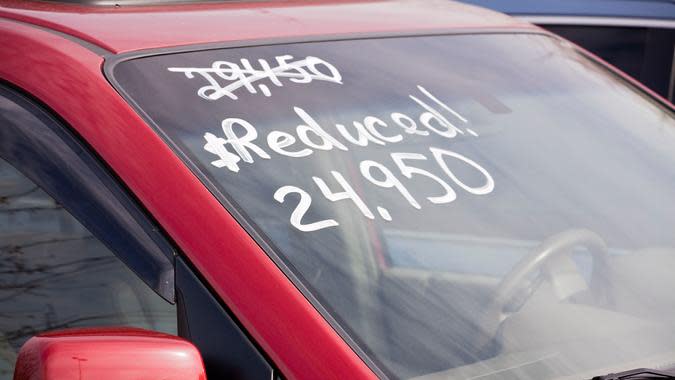
40. ‘I’m interested in your listing.’
If you recently listed a used car or other large item on Craigslist, eBay or Facebook Marketplace, you might receive some suspicious messages. Scammers may ask you to pay to connect them with a great buyer or to help them free up their money.
Stay safe: Remember, you’re the seller. You shouldn’t have to pay anything.

41. ‘You have been the victim of fraud.’
You receive a call from “your bank,” claiming that your card has been compromised and you must pay to unlock it. They might make it seem serious, but they’re scamming you.
Stay safe: Call your actual bank. Monitor your account for fraudulent payments.

42. ‘Subscribe to unlock more features.’
A service you’ve been using for months suddenly requires a subscription? Sounds like a scam.
Stay safe: Don’t pay for any bonus features unless you’re sure you need to.

43. ‘Your bank account is eligible for an upgrade.’
If your bank contacts you to say you can pay for a better card, special loan terms or fee-free accounts, take caution. It might not be your bank.
Stay safe: Contact your bank directly.

44. ‘You’ve been pre-selected.’
Again, you should never have to pay upfront for a loan or credit card offer. You’ve been pre-selected for fraud.
Stay safe: Only work with trusted financial institutions and contact them directly.

45. ‘Put a deposit down now.’
Someone offers you an incredible price on a new car, home, electronic device or other new purchase — you just have to pay a deposit to reserve it.
Stay safe: Take caution on online marketplaces. Never pay until you have the purchase in hand or proof that it will be delivered.

Street Scams
Financial fraud has been around since long before the internet. Although online scams and cyber-crimes are more prevalent today, old-school street scams haven’t gone anywhere.
These cons are common in tourist areas, especially overseas. They often target travelers who are unfamiliar with the area or customs. Whether you’re abroad or in your hometown, keep an eye out for these common street scams.

46. ‘This is for you.’
In this scam, someone hands you a small trinket — such as a a flower or handmade bracelet — pretending it’s free, then demands payment once you take it.
Stay safe: Don’t accept any gifts from strangers. If you do and they demand payment, hand the item back or put it down and walk away.

47. ‘No change.’
If you pay a street vendor with a large bill, they may claim they have no change and refuse to give it back.
Stay safe: Stick with trusted vendors and pay in exact change whenever possible.

48. ‘I can help with that.’
A kind stranger might offer to watch your bike while you’re in the store or show you around the city. Then they’ll demand payment — or steal your belongings.
Stay safe: Don’t accept unsolicited help.

49. ‘You didn’t pay the full amount.’
Another street vendor trick: After you pay, they’ll claim you short-changed them.
Stay safe: If paying in cash, take a picture of the amount before handing it over. If paying with a card, check your online account to verify the payment.
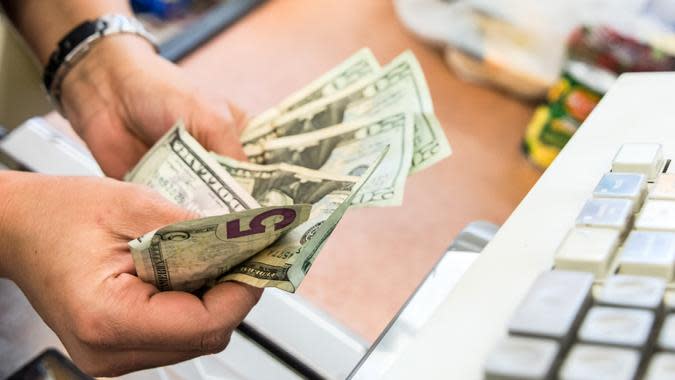
50. Pay To Enter
If someone tells you to pay them before entering a building, they might be scamming you.
Stay safe: Ignore the person and enter anyway. If you really need to pay, you’ll be charged by an official employee.

51. ‘That’s not our current menu.’
This is an old restaurant scam: The diners are lured in by a menu with false prices, then overcharged after the meal.
Stay safe: Look up a restaurant’s reputation online before you enter.

52. ‘Want to take a picture?’
A common scam outside Disney parks or at Times Square: Someone in a costume asks if you want a picture, then demands payment.
Stay safe: Avoid the character selfies — you’ll take more memorable pictures elsewhere.

53. ‘I bet I know where you got your shoes.’
This scam is common in New Orleans and other big cities. The scammer makes a bet, such as “I can guess where you bought your shoes,” then makes you pay after giving a tricky answer: “You got them on your feet.”
Stay safe: Ignore random comments or questions from strangers.

54. ‘My meter is broken.’
If you’re traveling in an area that still relies on taxis rather than a rideshare app, watch out for drivers who claim to have a broken meter. They’ll charge whatever they want after the ride.
Stay safe: Verify that the meter works before getting in the taxi.
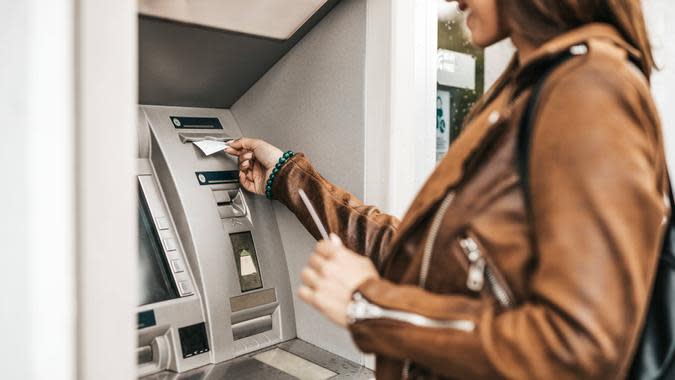
55. ‘That ATM has high fees.’
In this scam, someone approaches you at an ATM and offers a better price. They’ll then produce a handheld card reader that simply takes your money.
Stay safe: Only use legitimate ATMs in safe areas.

56. ‘This bill is counterfeit.’
If a vendor tells you your bill is counterfeit, they could just be after more money.
Stay safe: Ask for the bill back so you can pay by another method. If they refuse, walk away.

Social Media Scams
The FTC has referred to social media as the “golden goose for scammers.” People scrolling social media are already used to flashy messaging and exciting posts — it’s no surprise they’re vulnerable to scams. Keep an eye out for these common scams whenever you’re online.

57. ‘Hey guys, check this out.’
When someone in a TikTok or Instagram Reel has a deal that seems too good to be true, it probably is.
Stay safe: Carefully research any offers you see advertised on social media.

58. ‘We love your content!’
Someone sends you a flattering message and claims you would be perfect for their new opportunity — they may be looking for a payment.
Stay safe: Never send money or sensitive information to a stranger online.

59. ‘Your account has been hacked.’
When you receive a message claiming your social media account has been hacked, you might be dealing with a scammer.
Stay safe: Log into your account and check for suspicious activity. Never pay to prevent hackers.

60. ‘You have to try this.’
Is the product really that amazing, or are they trying to swindle you into a scam?
Stay safe: Carefully research any products or services you hear about through social media.

61. ‘I can’t believe this happened.’
Received a DM from someone you know claiming something terrible has happened, with an attached video? This is a common scam.
Stay safe: Don’t click the link. Call the person to tell them their account has been hacked.

62. ‘Take this quiz.’
Online quizzes can be fun, but they’re also an easy way to steal your information — like answers to your security questions.
Stay safe: Don’t take any quizzes you see on social media.

63. ‘We’re giving away free merchandise.’
You receive a message or watch a video that claims a company is giving away free merchandise — you just have to pay a fee or enter your information.
Stay safe: Never sign up for free offers on social media.

64. ‘Join this contest.’
Enter to win? More like enter to lose your money.
Stay safe: Never pay to enter a contest, whether it’s advertised on social media or through email.

65. ‘I have a great way to get rich quick.’
These offers might come from people you know, but that doesn’t make them legitimate. Unfortunately, there is no guaranteed way to “get rich quick.”
Stay safe: Politely decline these offers.

66. ‘Call me, it’s an emergency.’
Emergency scammers may try to get your attention through social media. Remember, just because you see the person’s account name doesn’t mean it’s really them.
Stay safe: Contact that person on another platform.

67. ‘Hey handsome/beautiful.’
Nearly 70,000 people reported romance scams in 2022. Romance scammers, or “catfishers,” will try to take your money through a false relationship.
Stay safe: Use other platforms to make sure the person you’re talking to is who they say they are.

Employment Scams
Looking for a job? If you’re not careful, you could end up falling victim to a scam. Employment scams target vulnerable people looking for work. These scams might involve an advance fee or an illegitimate business offer. Look out for these common ploys.

68. ‘I have an incredible opportunity for you.’
When someone approaches you with a seemingly incredible job offer, you should be cautious. If it sounds too good to be true, it probably is.
Stay safe: Ask them about the company or organization and do your research.

69. ‘Apply here.’
Illegitimate companies can still make their way to the top of search engine results. You may think you’re filling out an application, when you’re actually giving away your personal information.
Stay safe: If an application asks for unnecessary information or a fee, don’t finish it.

70. ‘We’ll help you get hired.’
While career advice can be helpful, watch out for scams that involve paying for “expert interview tips” or “early application opportunities.”
Stay safe: Stick with certified, well-reviewed career counseling services.

71. ‘Subscribe for more job listings.’
Some job search sites are legitimate, while others require high fees for unreliable listings.
Stay safe: Use highly trusted job search platforms, like Indeed and LinkedIn.

72. ‘You’ve been pre-selected for an interview.’
If someone contacts you claiming they’d like to schedule an interview, they might be trying to scam you.
Stay safe: Don’t trust interview offers from jobs you didn’t apply for.

73. ‘If you love these products, why not sell them?’
These kinds of offers — especially when they occur on social media — could be leading you to an illegal pyramid scheme.
Stay safe: Don’t agree to sell products if you need to pay out of pocket for them first.

74. ‘We need to check your credit.’
A prospective employer might look into your credit history, but they won’t perform a hard check on your credit.
Stay safe: You should only provide your Social Security number upon your hiring, after a legitimate in-person job interview.

75. ‘Want to live like me?’
Does an influencer want to share their secret to wealth with you? Chances are, they’re looking for payment.
Stay safe: Never trust an unrealistic offer to “get rich quick.”

76. ‘You can work from home.’
While remote work is real and common, scammers also use this promise to lure victims into paid schemes.
Stay safe: Research every opportunity you come across, especially remote opportunities at companies you’ve never heard of.

77. ‘Start your own business with this equipment.’
Starting a business requires a lot of overhead and careful planning. If they tell you it’s as simple as buying their product or equipment, it’s probably not.
Stay safe: If you want to start your own business, begin with careful research and planning. Don’t jump into an opportunity that requires an upfront cost.

78. ‘You have to apply right now.’
Employers may be in a rush to hire someone, but not such a rush that they’ll beg you to apply immediately. If you must apply today for that amazing opportunity, it’s probably a scam.
Stay safe: Never rush into an application process without researching the company first.

Housing Scams
Looking for a new house or apartment is stressful enough without the risk of scammers. If you’re perusing the housing market, keep an eye out for these common schemes.

79. ‘Pay your deposit in advance.’
Anyone who asks you to pay a deposit before seeing the home is trying to scam you.
Stay safe: Never pay a deposit until you have signed a lease.

80. ‘Pay to schedule a showing.’
“Showing fees” are uncommon and unethical, especially for rental listings. You probably won’t hear back about that showing.
Stay safe: Stick to listings that offer free showings.

81. ‘This deal is too good to pass up.’
In today’s housing market, most sellers aren’t desperate to bring in buyers. If a seller or renter insists that you must choose their house right away, they may be a scammer.
Stay safe: Pass up offers from pushy sellers.

82. ‘I’m subletting my apartment.’
Many scammers find photos of old listings online and repost them, claiming to be subletting or looking for a roommate.
Stay safe: Contact the subletter directly and make sure you see the home before you pay.

83. ‘Get insider tips on the housing market.’
Buying or renting is expensive enough — don’t pay extra for phony tips.
Stay safe: Ignore these offers in your inbox.
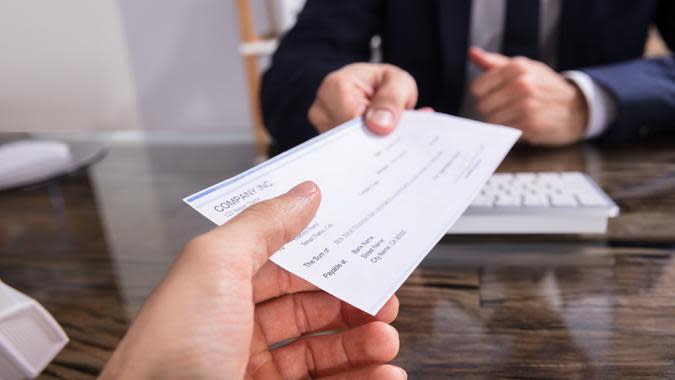
84. ‘Your rent check bounced.’
Received a weird message from your landlord asking for more money? That might not be your landlord.
Stay safe: Contact your landlord directly.

85. Below Market Rate
If that “BMR” listing seems a little too cheap to be real, it’s probably fake.
Stay safe: Ignore or report extraordinarily cheap listings.

Debt Repayment Scams
Lower-income households are especially vulnerable to money scams — and that includes people in debt. If you’re working on repaying your loans, be careful to avoid scams that promise a better deal or threaten you with fines. Check out these examples.

86. ‘Your account is (suddenly) past due.’
Received a sudden, unexpected phone call that your account is extremely overdue? Don’t panic. It’s probably a scam.
Stay safe: Call your lender or check your account balance online. Never pay a caller directly.

87. ‘Refinance your loan with us.’
While loan refinancing is legitimate, take caution with unrealistic or pushy offers.
Stay safe: Only refinance your loan with your current lender or another established institution.

88. ‘Your relative left you a debt.’
Like the mysterious inheritance, that mysterious debt probably isn’t real.
Stay safe: Never pay a strange caller or messenger.

89. ‘You must pay us right now.’
Is your lender suddenly pressing you to pay your full balance immediately? Check again — that’s not your lender.
Stay safe: Stick with your repayment plan and report any impersonators.

90. ‘You have outstanding fines.’
If you don’t remember getting those fines in the first place, you probably don’t need to pay them.
Stay safe: Before paying any outstanding fines, make sure the sender is legitimate.

91. ‘You must pay us right now.’
Is your lender suddenly pressing you to pay your full balance immediately? Check again — that’s not your lender.
Stay safe: Stick with your repayment plan and report any impersonators.

92. ‘You’ve received a parking ticket.’
You can repay parking tickets online, but you probably won’t receive them online, especially not through a random email.
Stay safe: Contact your city’s parking authority to find out if the ticket is real.

93. ‘I represent your lender.’
Scammers claiming to represent your lender may tell you they’ve updated their payment methods, asking you to provide your payment information or pay them directly.
Stay safe: Contact your lender about the message.

Government Impersonation Scams
Like emergency scammers, government impersonators play on your fears to get a quick payment. You might be inclined to believe someone who claims to be a government official, especially if they’re using intimidation tactics. However, remember to take a breath and think logically. Real government officials aren’t looking for handouts.
These common government impersonation scams are designed to scare you out of your money.

94. ‘This is the IRS.’
When the “IRS” calls you demanding an urgent payment, hang up. If the IRS needs to contact you, it’ll send several notices in the mail first.
Stay safe: Ignore or report these calls.

95. ‘You can just pay me here.’
This is another common travel scam: “Police” pull you over or give you a bogus ticket, then say you can settle it with them directly.
Stay safe: Follow all laws in a foreign area — don’t give impersonators grounds to “fine” you. If you do pay an impersonator, report them to the real authorities later.

96. ‘You’ve been selected for jury duty.’
Jury duty is real — paying to hold your place or signing up with your bank account information is not.
Stay safe: Real juror summons come in the mail or through personal delivery. Ignore any summons you receive through a text, email or phone call.
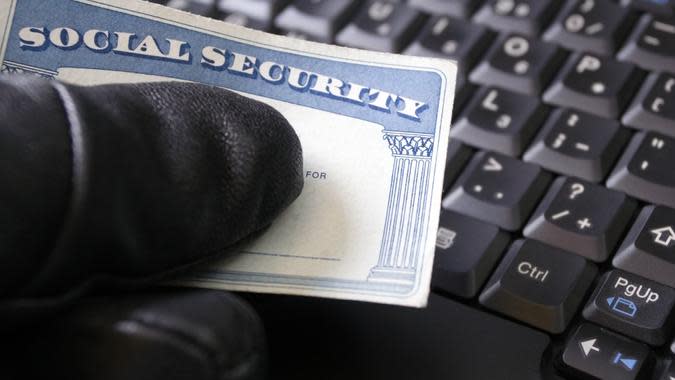
97. ‘There is a problem with your Social Security account.’
Social Security scams commonly target retired Americans. If you’ve received a notification claiming there is something wrong with your Social Security account, it may be a scam.
Stay safe: Never provide your Social Security information online, unless it’s through ssa.gov.

98. ‘Your Medicare coverage has been suspended.’
Your health insurance has suddenly been suspended, and you must pay now! Don’t panic — this is a scam.
Stay safe: Call Medicare directly at 1-800-MEDICARE.

99. ‘You will be placed under arrest.’
No, you are not in danger of being arrested due to unpaid fines, speeding tickets or some other crime you weren’t aware of. The scammer may even claim the police are already on their way, but don’t panic — they’re not.
Stay safe: If someone calls claiming you’re under arrest, hang up. Report the call to the police.
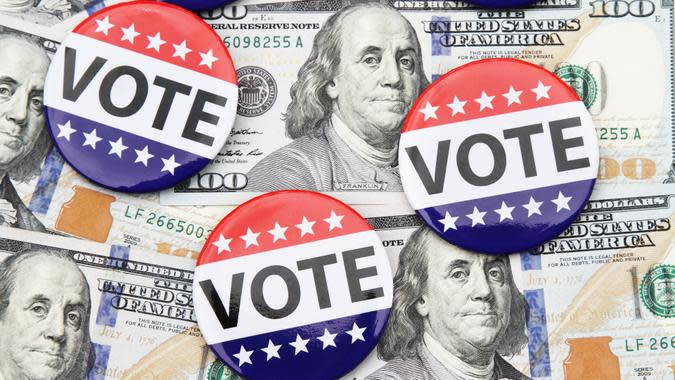
100. ‘Please donate to my campaign.’
A presidential candidate contacting you directly? It’s probably a scam.
Stay safe: If you want to donate to a candidate, research legitimate campaign sites.
More From GOBankingRates
9 Things You Must Buy at Big Lots While on a Retirement Budget
10 Worst Cities To Buy Property in the Next 5 Years, According to Real Estate Agents
This article originally appeared on GOBankingRates.com: 100 Most Common Money Scams and How To Avoid Them